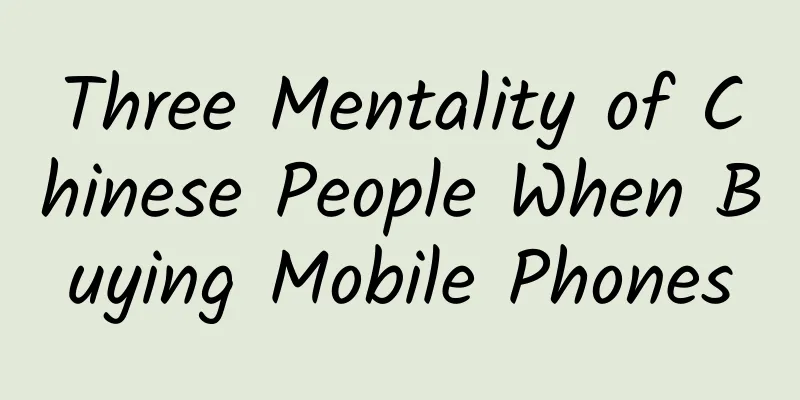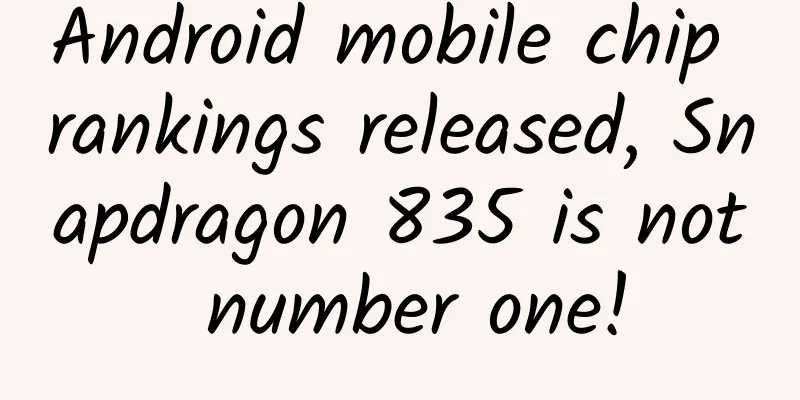Three Mentality of Chinese People When Buying Mobile Phones

|
Buying a mobile phone is a complicated process. The first step is to determine the budget. How much money are you prepared to spend, and what is the upper limit (those who have been using "I spit" phones for many years, please don't show off, I have a serious red eye disease). The second step is to determine what phone to buy. Samsung? Apple? Huawei? Xiaomi... How to determine? It is definitely not to line up pictures of phones within the budget on a computer screen, and then close your eyes and poke them randomly. The one you poke is the one. There must be a basis. What is the basis? There are three relatively broad bases: First, this kind of phone has good sales, so buy it; second: hearing is false, seeing is believing, someone around you uses this phone, the quality is good, the experience is also good, and the after-sales service is impeccable, so buy it; third: authoritative recommendation. The authority here is the authority in a small circle. In a small circle, there are always enthusiasts in a certain aspect, whether it is movies, books, digital products, or smart phones. They are the first batch of users of new products, play a guiding role, and also serve as part-time preachers. Logically speaking, the first type of users is the most important because they are the largest in number, followed by the second type, and the third type is the least. However, sometimes, we cannot just start from sales volume. Mobile phone sales can be roughly divided into four stages: release, climbing, peak, and long tail. The mainstream consumers of a product are generally in the second or third stage. They are the sheep following the leader. The leader is the one with the least authority and determines the direction of the flock. They are the users faced in the release stage of smartphones, and their reactions determine the users in the second stage, that is, the climbing stage. And the users in the second stage determine the users in the third stage. Let me give you an example (this example comes from Zhihu. I forgot the speaker's ID. Apologies. If you want to show your ID, please @ me on Weibo). An entrepreneur spent three months learning about a laptop computer, from the experience to the size, etc. He understood it thoroughly, better than an expert. In the end, he spent more than 10,000 yuan to buy it. He was happy for a week. Then, he went to meet an investor with this laptop. The investor took the laptop and looked at it for about ten seconds. He asked a question about the laptop, asking if it was easy to use. After getting the answer that it was very easy to use, he called his female secretary and pointed at the laptop: "Give me one." This example is a good example of the latter two types of consumers: those who accept authoritative recommendations and those who believe that seeing is believing and hearing is not. The following is a brief introduction to the different psychology of the above three types of consumers: The first type of consumers, the largest number of consumers, are influenced by the radiation power of brand and sales. A typical example is the E series of ThinkPad laptops. Originally, ThinkPad's status and user experience were at the level of Qiao Feng in the north and Murong in the south, and so was its price. Suddenly one day, the E series was released, and the price was affordable. Everyone knows that there is a principle in business that you get what you pay for. According to this principle, the E series cannot have the experience of the T series. In fact, this is indeed the case. In addition to the ThinkPad trademark and a similar appearance, the E series has no advantages over laptops of the same price. However, this does not prevent the E series from selling well. Samsung's performance in the Chinese market also illustrates this point well. The sales of the flagship Galaxy S5 have suffered a Waterloo, the radiation power has been greatly reduced, and the mid- and low-end have been retreating. Of course, the loss of the mid- and low-end is not all the reasons, but it is at least one of the reasons. Why does sales volume have a radiating effect? Today, society is advancing rapidly, and no one can have all the knowledge he needs. Take smartphones for example. To judge the quality of a smartphone, you need to know many terms about the screen - resolution, OLED, IPS, full lamination, pixel arrangement, viewing angle, cold and warm, etc. You also need to know the SOC, whether it is Qualcomm, MediaTek, or Samsung, and yes, Huawei HiSilicon Kirin; you also need to know a little about the operating system, whether it is iOS or Android, original Android, or third-party ROM, and the third-party ROM is MIUI, flyme, or CM. In addition, the material of the shell should also be dabbled. Metal is different from metal, brushed or not? Do you want an ultra-narrow frame? Will it cause misoperation? We need to consider issues such as quality, experience, and appearance. There are very few people who know these issues well, and there are very few people who can make judgments based on known conditions such as parameters and reputation. In other words, we can't judge. We need to make judgments and make choices. However, we don't have the time or energy to learn relevant knowledge. What should we do? We can't not use it. We make choices quickly, choosing the best-selling or most famous brand. This is a social experience. Good sales or a famous brand means good quality and a good experience. They skip the process of understanding and rush directly to the result. This is human instinct. Society is too complicated for us to handle alone, so we have to take shortcuts. This shortcut behavior is correct in nine out of ten cases. At the same time, this shortcut behavior is the basis for most, even the vast majority of purchases. The second is the influence of seeing is believing and hearing is false. In fact, it is the power of example. A friend or colleague around you bought a mobile phone, and you happened to be planning to change your phone. Naturally, you would ask about his phone. If his evaluation is good, you would buy one. This saves you the process of learning by trial and error. Or, you originally had no plan to change your phone, but your colleague's phone looks good and the user experience is also good. He recommends it, and you feel itchy and think about changing the phone earlier. Then, six out of ten times, you will change to another one. There is another point that is more Chinese in nature: after years of market economy, seeing is believing and hearing is false is becoming a principle for Chinese consumers. The third type, the smallest and most important, is authority. As the saying goes, a year's plan starts with spring, and a day's plan starts with the morning. Authority is spring and morning. Convincing or influencing the "authorities" in a certain field to buy your own products means paving a road that may lead to Rome or to the sewers of Rome. Whether it is Rome or the sewers of Rome, they must take this road. If they don't take it, nothing can be achieved. How can we get the "authorities" to come to the fore, or what are the factors that influence the path that the authorities choose? Reputation is the key. This reputation includes the historical reputation of quality, after-sales service, etc. If the reputation is similar, the appearance and other factors play a decisive role. Price is of course also a decisive factor. But in the first round of screening, the price has been determined - there are few financially independent people, and most people have limited the price range when buying smartphones at the beginning. Unless the quality is similar and the price difference is relatively large, otherwise, the price difference will not be the decisive factor for smartphones with similar configurations - this also involves a trend: technology is advancing, craftsmanship is maturing, and smartphones, especially smartphones of the same price, no longer have obvious quality differences. The user satisfaction of major smartphone manufacturers in North America is not less than 70%. Apple 79%, Samsung 81%, Nokia and Motorola are 77%, and the worst LG has 73%. Televisions, air conditioners, computers, etc. have all gone through this path, and smartphones are just going through this path again. If the brands have similar historical reputations, or are relatively new brands with little historical reputations (except for a few, domestic smartphones had similar reputations in early 2013), and the quality is similar, factors other than products can play a decisive role, such as Huawei's patriotism and Xiaomi's sense of participation. The reason why Hammer's "born pride" did not receive as much response as the initial "sentiment" is partly due to the influence of the legacy reputation (and partly because the born pride is a bit young). Once the authorities choose a brand of product, they will defend and promote the brand (not just the authorities, everyone does this). This behavior may be difficult to understand, but it does exist. If it is extended to the field of sports, it may be easier to understand. Our football fans and colleagues around us have said or often said how Inter Milan is, how Manchester United is, how Real Madrid is, and when their favorite team loses, they will feel the same. The authorities hope that the products they use (or their values) will be recognized and promoted. People in authority circles are obedient (there are many reasons for this obedience, which I won’t go into detail here). In summary, I think patriotism played a huge role in the sales of Huawei Honor. (Editor: For this view, please refer to the author's previous article "What does the success of a 1,999 yuan mobile phone require?" ) PS: 1. The lag in product sales is not discussed in this article; 2. The situation of students who have not yet graduated and young men who are still eager to learn are rather special and are not within the scope of this article. As a winner of Toutiao's Qingyun Plan and Baijiahao's Bai+ Plan, the 2019 Baidu Digital Author of the Year, the Baijiahao's Most Popular Author in the Technology Field, the 2019 Sogou Technology and Culture Author, and the 2021 Baijiahao Quarterly Influential Creator, he has won many awards, including the 2013 Sohu Best Industry Media Person, the 2015 China New Media Entrepreneurship Competition Beijing Third Place, the 2015 Guangmang Experience Award, the 2015 China New Media Entrepreneurship Competition Finals Third Place, and the 2018 Baidu Dynamic Annual Powerful Celebrity. |
<<: Musk and Jack Ma's two surprising coincidences in starting a business
>>: Lao Duan said: How far is Huawei from television?
Recommend
How to achieve product growth and acquire and retain users at low cost?
In March 2017, Coca-Cola announced that it would ...
The auto market is cold, but demand is booming. When will the new energy market thaw?
In the first quarter of this year, the new energy...
Will capital be defiled when it enters the pure holy land of the second dimension?
Recently, major news platforms almost simultaneou...
Android M system in-depth hands-on
Google released the Android M developer preview a...
Reflections on the chaos of "Internet thinking": products, communities and self-organization
The chaos and reasons under the Internet thinking...
Mobile phone accelerometer data can be read at will, iOS cannot turn off permissions, Android can limit it this time
[[435012]] This article is reprinted with permiss...
Tencent architect Xiong Pujiang: WeChat's success is not accidental
So far, WeChat has nearly 600 million monthly act...
The secret of Toutiao article recommendation mechanism: how to get massive recommendations?
Whether for the sake of money or the platform'...
Re/code editor tries out iOS 9: Upgrading is not recommended at this time
Apple recently released a beta version of iOS 9 a...
The popularity of "Honghuang Girl" is a microcosm of the era of sports fission
This Olympics was a bit dull, and the audience wh...
Alipay has been revamped again: payment and collection are combined, and travel is included in the "Four Great Kings" for the first time
Your Alipay is about to be upgraded again! On May...
GSMA: China's 5G vertical industry application cases in 2022
2021 is a critical year for 5G to achieve initial...
Plague and the Evolution of Diet: The Three Years of the Black Death in Europe
Written by | Wei Shuihua Header Image | foodiesfe...
What happened to oil prices returning to the 5 yuan era? What impacts will it have? Which year was the era of oil price at 5 yuan?
Affected by the sharp drop in international oil p...
Operational review: attracting new users and monetizing in online education!
The author of this article starts from his own wo...









